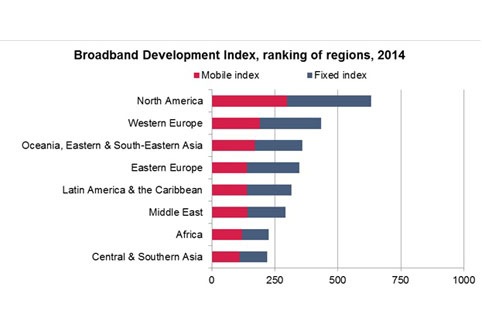
Mobile data connections and services are growing strongly in Africa, but the continent continues to lag behind most of the rest of the world in terms of high-speed broadband connectivity, according to new research by global analyst firm Ovum.
The number of mobile subscriptions in Africa continues to grow faster than in any other major world region, with total mobile subscriptions increasing by 9.8 per cent year-on-year to 808 million at end-2013, compared to the global growth rate of 6.3 per cent. At end-2Q14 Africa’s mobile subscriptions count had risen to 851 million, and Ovum expects it to cross the one billion mark in 2016 and reach 1.23 billion by end-2019.
“But with the rate of growth in mobile subscriptions slowing – the number of mobile subscriptions in Africa will increase by only about 5 per cent year-on-year in 2019 – the more significant development within Africa’s mobile market is the growth in mobile data connections and services,” said Matthew Reed, practice leader for the Middle East and Africa at Ovum.
The number of mobile broadband connections on the continent will rise from 96 million at end-2013 to 950 million at end-2019 (equivalent to 77.3 per cent of total mobile subscriptions), driven by the roll-out of mobile broadband networks on the continent and the increasing affordability of data devices such as smartphones.
However, fixed broadband connectivity in Africa is still very low. Fixed broadband household penetration in Africa was just 5.2 per cent at end-2Q14, the lowest rate among major world regions.
“Despite the growth in mobile data connectivity on the continent,” said Reed, “Africa is ranked second-to-last among world regions in terms of its broadband development.” According to Ovum’s Broadband Development Index, a new research service that tracks the take-up of high-speed fixed and mobile broadband services in 191 countries (see figure), Africa has a Broadband Development Index score of 226 out of 1,000 for 2014, just ahead of Central & Southern Asia (219 out of 1,000), but a long way behind the leading regions, which are North America (633) and Western Europe (433).
Within sub-Saharan Africa, and taking into account only those countries with a population of more than three million, South Africa, Kenya, Zimbabwe, Uganda and Nigeria have the most advanced broadband markets, with 2014 Broadband Development Index scores of 262, 244, 241, 227 and 227 (both Uganda and Nigeria score 227) out of 1,000 respectively. However, South Africa ranks only 103rd out of the 191 countries worldwide tracked by the Broadband Development Index in 2014, and African countries account for eight out of the ten lowest-ranked countries in the Index in 2014.
“Ovum’s data shows that despite the remarkable advances made by Africa’s telecoms sector, the continent remains behind most of the rest of the world in terms of its adoption of fast broadband services. Bridging that digital divide should be a high priority for African governments, regulators and the industry, because of the economic, social and commercial benefits that it could bring,” concluded Reed.
Credit: Ovum
This story also appears on IBC’s Content Everywhere.








